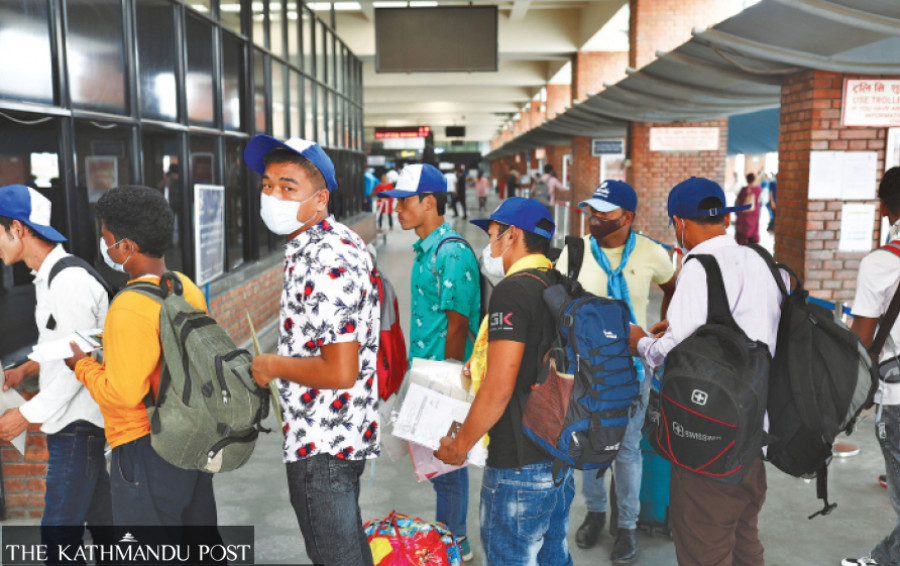Money
Government to review provision requiring recruitment agencies to send minimum 100 workers abroad
Manpower agencies have been lobbying for scrapping the provision ever since it was introduced in 2019.
Pawan Pandey
The government is set to review a provision that requires a recruiting agency to send a minimum 100 workers abroad for two consecutive years to renew their licence.
Speaking at the 29th annual general meeting of Nepal Association of Foreign Employment Agencies in Kathmandu on Friday, Ek Narayan Aryal, secretary at the Ministry of Labour, Employment and Social Security, said it is necessary to amend the flaws in the law to streamline the labour industry.
Recruiting agencies have been lobbying against the provision ever since it was introduced in 2019, calling it discriminatory.
This provision was included in the fifth amendment to the Foreign Employment Act (2007) in March 2019.
The then Labour Minister Gokarna Bista had introduced the rule to discourage the mushrooming recruiting agencies.
Rajendra Bhandari, the newly-elected president of the Nepal Association of Foreign Employment Agencies, said that the rules to send minimum workers have no scientific rationale.
“An agency sends more than 1,000 workers in a particular year, but the numbers can remain below 100 in another year. It depends on demand,” said Bhandari. “The number of recruiting agencies had already reduced when the minimum guarantee amount was increased to Rs 20 million.”
The provision, however, has not been effectively implemented since the Covid-19 pandemic, according to Krishna Prasad Bhusal, information officer at the Department of Foreign Employment. “The government relaxed the provision during the pandemic,” said Bhusal.
Jeevan Baniya, assistant director at the Centre for Study of Labour and Mobility, Social Science Baha, a non-profit organisation involved in research in the social sciences in Nepal, said the agencies should deal with fair recruitment practices. "The number should not be the concern."
“Since a recruitment agency has to deposit a certain amount of money as a collateral, the minimum requirement seems unnecessary,” Baniya added.
A recruitment agency needs to deposit Rs 20 million to Rs 60 million guarantee money to run the business depending on the number of migrant workers it sends in a year.
While the required amount for the agencies that send less than 3,000 workers is Rs 20 million, those sending 3,000 to 5,000 workers and more than 5,000 labourers have to deposit Rs 40 million and Rs 60 million, respectively, according to Bhusal.
There are 880 recruiting agencies for foreign jobs in the country, according to Bhandari.
The recruitment agencies have also been demanding the provision of "demand letter certification" by Nepali mission abroad be removed. “It has only lengthened the recruitment process, especially in new labour destinations,” said Bhandari.
The Nepal government made it mandatory in 2018 for recruiting agencies and foreign companies, seeking Nepali migrant workers, to get their work demand letters approved by the Nepali foreign missions based in destination countries.
The rule was introduced to prevent aspiring migrant workers from being cheated through fake demand letters.
“While the recruitment process in India and Bangladesh completes in a month, it can take up to six months in Nepal,” said Aryal. “The certification process of labour demand has created hassles in sending skilled workers to new labour destinations in Europe,” said Aryal.
“We aim to hold discussions among stakeholders concerned, if the existing provision needs to be amended or scrapped,” said Bhandari.
According to the government statistics, Nepalis migrated to 150 countries between fiscal year 2019-20 to 2021-22.
Nepal, however, has only 37 diplomatic missions abroad including embassies and consulates.




 19.6°C Kathmandu
19.6°C Kathmandu














